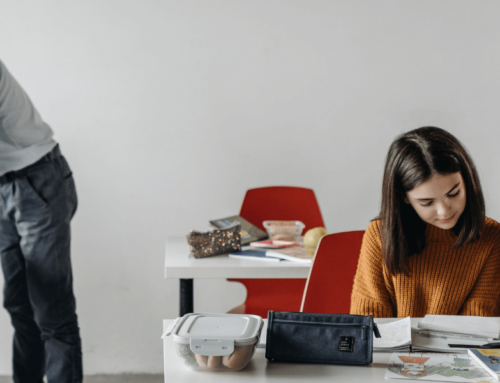As I Zoom around the Northwest Educational Service District 189 (NWESD) region, visiting with teachers, administrators, and other school staff members, I have noticed that people are exhausted and REALLY looking forward to some well-deserved time off. While the end of any school year often finds educators giving their last bit of effort to make it to the winter break, this year it feels much more pronounced.
I see a similar phenomenon with my own family and friends as well. Adults and children alike are struggling to keep moving, keep motivated, and stay productive. And, if I’m being honest with you, dear reader, I feel it too. Although I am amazed and inspired daily by the grace of the people around me, I still find myself feeling sad, unproductive, and sometimes even angry (which is not a typical emotion for me). So, I’ve been trying to figure out – what IS this thing that is happening to us? Certainly, there are plenty of good reasons for feeling a bit off right now, but how can we wrap our minds around what we’re experiencing and move forward in a healthy way?
As luck would have it, just as I began to really ponder these questions, David Forsythe, Assistant Superintendent for Operations at the NWESD, shared an article, titled Your ‘Surge Capacity’ Is Depleted — It’s Why You Feel Awful with me that helped to answer these questions. According to this article from Elemental by Tara Haelle, we’re experiencing what Pauline Boss, Ph.D., family therapist, and professor emeritus of social sciences at the University of Minnesota refers to as “ambiguous loss”. In a nutshell, even for those of us who haven’t experienced the loss of a loved one or a job during this time, the long period of uncertainty, stress, and adversity brought on by the COVID 19 pandemic and all of its ramifications has created an experience of loss that’s difficult to pinpoint and is ongoing. Unlike losses due to a natural disaster, these losses are mostly invisible and will extend for an unknown period of time. One of these major losses is education as we know it- the ability to make connections, when and as needed, with students and families; and the ability to plan, with any certainty, for a better future under “normal” circumstances.
Make no mistake, educators in our region are learning quickly and well about the magic of educational technology, the importance of family engagement, and how to make distance learning work, but the constraints of our current situation make it difficult to stay upbeat. From what Haelle has learned, this long period in which we’re facing many big problems with no good solutions is really having a profound impact on all of us. For people who are solution-oriented, like educators, that impact may be even more profound. There is some good news though; like the idea that smooth seas don’t make good sailors, this time of ambiguous loss can help us learn about the things that we can all do to move through stormy seas in healthy and productive ways.
One of the healthy things we can do when we don’t have control of a situation is… well… to accept the situation as it is. Michael Maddaus, MD, professor at the University of Minnesota, promotes the idea that “radical acceptance” is a key to wellness. Instead of using mental energy to fight a situation that is out of our control, by accepting that things are as they are (even if we’re not happy about it), we free up that energy for more constructive activities and ideas.
Once we’ve let go of resisting what is, we can get to the work of replenishing ourselves, figuring out how to have a good time (in spite of these hard times), and strengthening our core relationships.
For me, all of these things have become a bit more complicated because of social distancing, restrictions, and health concerns, but with a good dose of creativity, I’m finding some success. For example, I’m learning how to meditate and do yoga and I try to take a walk before or after work to replenish myself. Ed Jr. and I have rediscovered jigsaw puzzles and I’m finding that the conversations we have while putting the pieces together are connecting us in new and special ways. I’m doing more cleaning, organizing, and taking on inexpensive home projects to get a great hit of dopamine from seeing the changes in my space (we’re spending A LOT more time at home, so any change is welcome). My family members around the country are getting more used to video calls to catch up. In fact, we see each other more now than before the pandemic (quick tip–: a Google search of Zoom questions for family really helped with the awkward silences that were making the video calls painful).
In all, the frustration that I’ve experienced during this difficult time now sometimes gives way to an acceptance which allows me to consider what gives me the energy to build more wellness into my life. I’m using any positive energy that I can muster to build what Maddaus calls a resilience bank account. By working on developing regular habits that promote health and wellness when things are going well (good sleep, nutrition, exercise, gratitude, self-compassion, etc.) I’m trying to develop greater resilience when things are more difficult. My hope is that we can all move into a new and better normal soon with a greater awareness of who we are as individuals, what we need to survive and thrive, and what connects us as humans. Until that new and better normal comes, I do hope you’ll be kind to yourselves, take some time for reflection and self-discovery and connect, however you can, with the amazing people and support systems surrounding you.
Bibliography
Haelle, Tara. “Your ‘Surge Capacity’ Is Depleted — It’s Why You Feel Awful.” Elemental,
Medium, 16 August 2020,
Accessed 8 December 2020.




